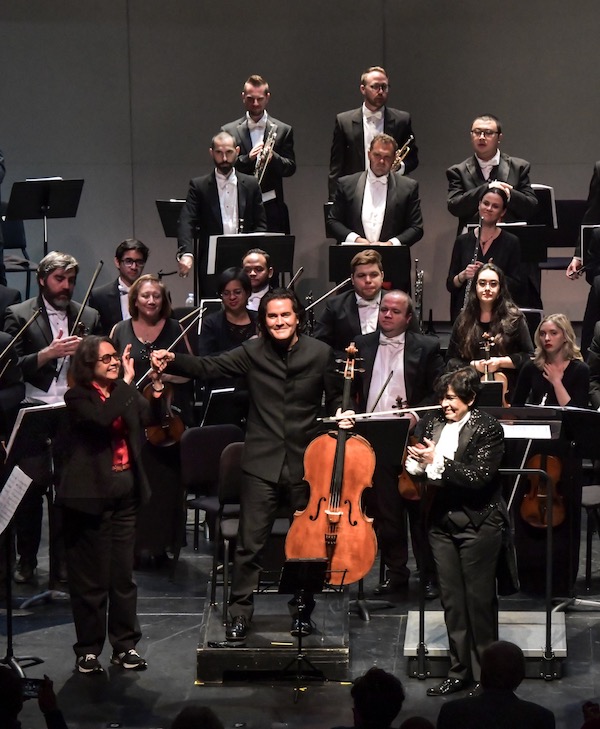Composer Zwilich adds to her musical legacy with Cello Concerto premiere

Ellen Taaffe Zwilich is one of America’s preeminent composers, with a consistently excellent body of work in multiple genres spanning nearly five decades — including another standout that had its world premiere on Thursday night with the South Florida Symphony Orchestra and cellist Zuill Bailey.
In remarks introducing her Concerto for Cello and Orchestra, Miami native Zwilich, 81, told the audience at the Broward Center’s Amaturo Theater that the cello has a unique ability to sing, encompassing the full vocal range of a singer’s lowest to highest notes. She has dedicated the new concerto to Bailey, SFSO conductor Sebrina Maria Alfonso, and to the memory of two great cello exponents: Leonard Rose and Mstislav Rostropovich.
The interconnected, three-movement score runs 15 minutes and is prime Zwilich. It opens with a cello solo tinged with dark lyricism. Soon, bluesy strokes jazz up the musical landscape. A muted trumpet wails and some of the best clarinet licks this side of Gershwin’s Rhapsody in Blue add atmosphere to the bravura solo line. The final movement is a hymn-like anthem, bringing a satisfying sense of closure.
Zwilich rarely repeats a melody exactly the same way. Constant changes of orchestration and thematic paths abound as each new episode grips the listener. Orchestral incidents are replete with instrumental color and surprise, as when plucked strings underpin the cello’s angular fragments. Zwilich’s new work, which was commissioned by the South Florida Symphony, is an important addition to the cello concerto literature.
Bailey tackled Zwilich’s writing with dashing virtuosity. A formidable musician and master of the instrument, his depth of tone and accuracy of intonation, even in the cello’s top reaches, were consistently impressive. He seemed totally inside every bar of the music, bowing with incisive zest and nodding his head to the orchestral riffs. Alfonso and the orchestra offered well-coordinated, rhythmically alert support. Cheers and bravos broke out afterward, when Zwilich joined the artists on stage.
The program opened with another commissioned premiere. Sunset, by Key West composer John D. Gottsch, is cinematic soundtrack music, albeit of the high-end variety. Gottsch’s seven-section score is actually a nearly 20-minute tone poem. It traces the birth of his home island, its battles with nature including hurricanes and flooding, and the peril of Key West sinking under a climate change tide.
Fanfares, surging gestures, ascending and descending figures, and lush orchestration suggest John Williams, Erich Wolfgang Korngold and the orchestral showpieces of Ottorino Respighi. The score is effectively conceived, entertaining, and avoids wearing out its welcome. Alfonso — also this work’s dedicatee — conducted Gottsch’s canvass with enthusiasm. The ensemble’s brass were outstanding, carrying the piece’s sonorous journey, but the violins occasionally strayed from pitch and unanimity.
The concert’s second half featured less frequently performed works by Beethoven and Mendelssohn with variable results. Noble introductory exclamations of Beethoven’s Consecration of the House Overture were shaped perfunctorily by Alfonso, but the allegro section was far too fast, and the 60-plus-member ensemble ill-balanced, with brass frequently overwhelming strings and winds.
Mendelssohn’s Symphony No. 5 (“Reformation”) went considerably better. Actually, the composer’s second full-scale symphony, but not published until 21 years after his death, the score has deep roots in Lutheran musical worship, even quoting a hymn by Martin Luther. The work is difficult to bring off in performance, resulting in many conductors choosing to avoid it.
Alfonso’s advocacy and leadership were mostly capable. In the introduction to the first movement, the strings’ repeated sounding of the “Dresden a-men” was distinctively underlined. The Allegro con brio was agitated to the point of being hard driven with a blunt edge.
Alfonso brought a deft touch to the Allegro vivace second movement, the winds phasing with elegance. While the Andante con moto would have benefited from a more relaxed tempo, the prelude to the finale — which directly quotes Luther’s hymn “A Mighty Fortress is Our God” — was beautifully detailed and the Allegro maestoso exhilarating. The brass’ final statement of the hymn emerged triumphantly.
The South Florida Symphony Orchestra repeats the program 7:30 p.m. Saturday at Temple Israel in Miami and Sunday at the Tennessee Williams Theater in Key West. southfloridasymphony.org
Posted in Uncategorized
Leave a Comment
Fri Mar 6, 2020
at 1:51 pm
No Comments






